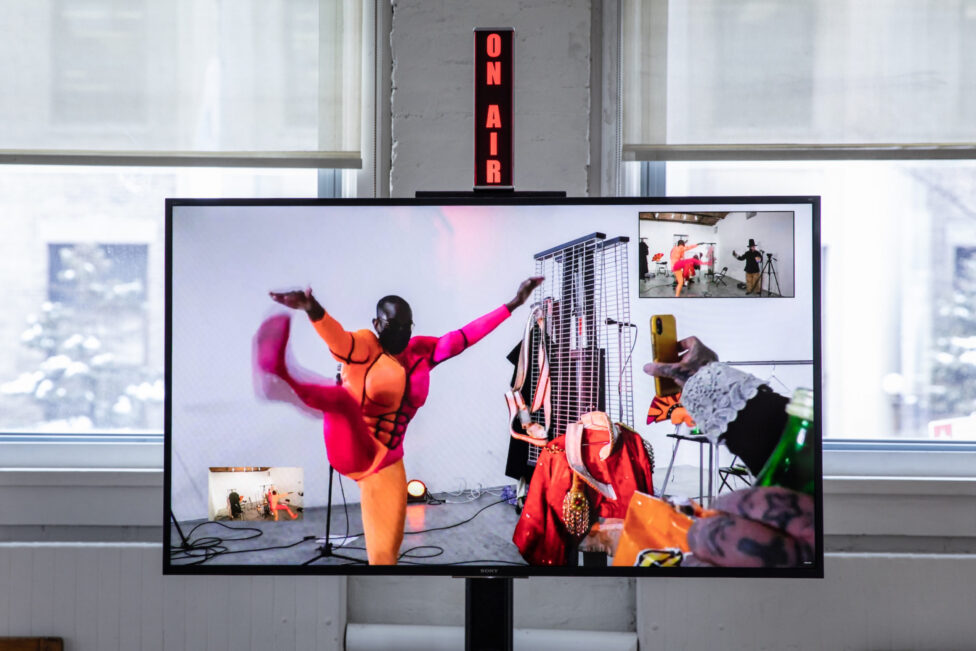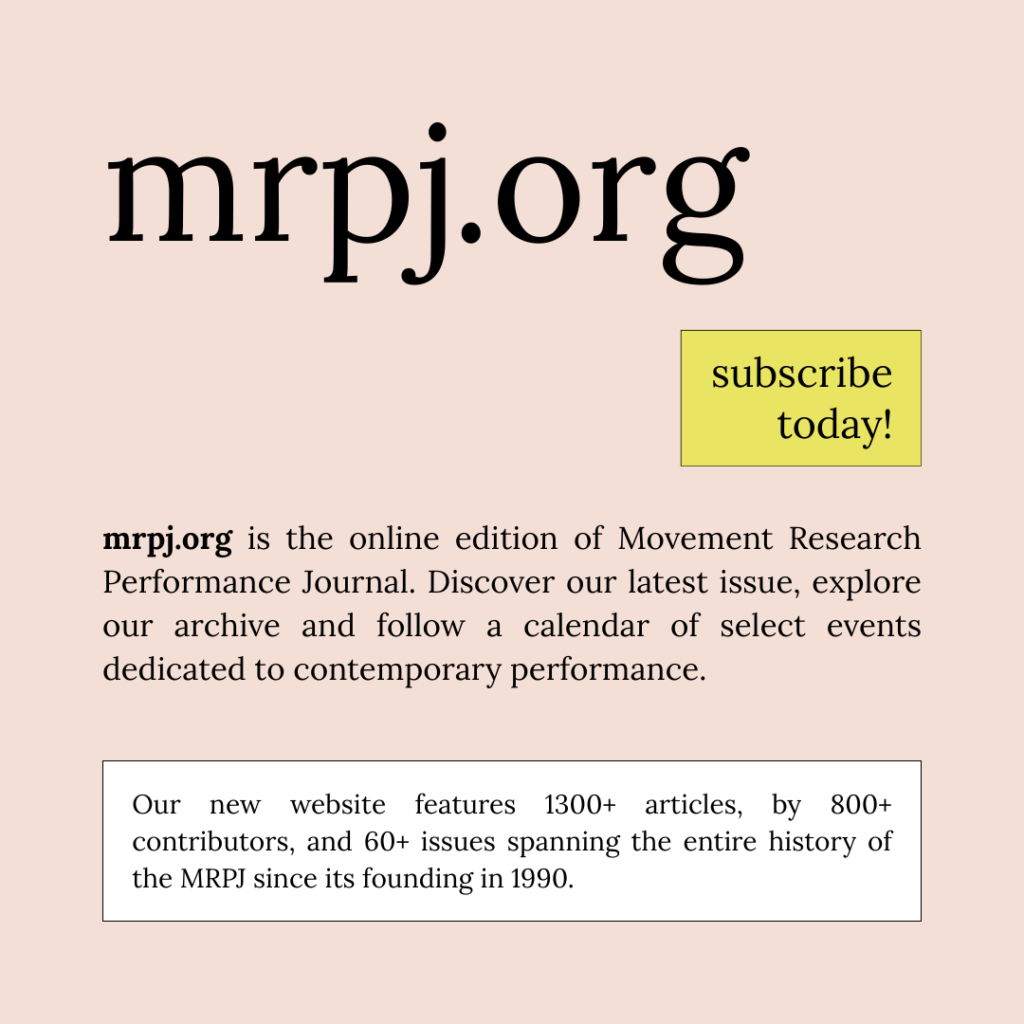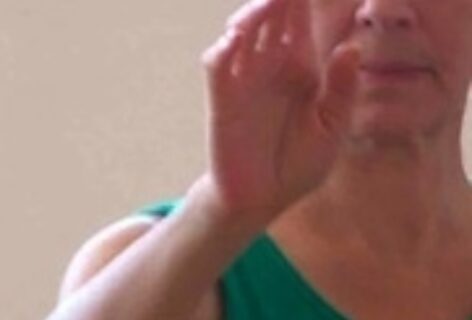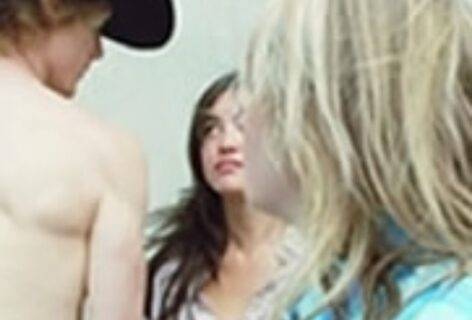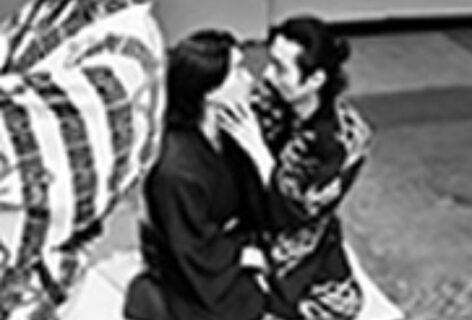Nile Harris: I want to ask you about the digital performance that you’re doing. Was it something that was happening online? Or were you remote staging a piece on somebody else physically at Performance Space?
Elliot Reed: I was invited by sculptor Dozie Kanu to perform inside his installation at Performance Space called Blood Type. So, I created “Untitled” with g dancer, performer, and visual artist Isabel Legate.
We actually did this piece together in Austin, Texas for the first time. I was invited by this program called OUTsider Fest to do a performance. I was stuck in New York because of COVID. So I put out a call for performers and was introduced to Isabel online. We created this system where it’s a bit of a closed loop. I am in direct communication with Isabel who is performing live in whatever city we’re making the piece. The audience can see my image and hear Isabel speak her responses to me, but I’m on mute. So the audience sees what I’m seeing, because I’m watching a live video feed of the stage, but they can’t hear what the performer is hearing—they can only hear how the performer is responding. And through this multiplicity of semi-accessible points of view, we’re creating a bit of a… suspended reality…
I don’t really love that term. It was an experiment for me in the studio to try and find a way to make long distance performing more interesting, or how I could write physical distance into the score, and not just treat it like a wall. If we’re doing this, I’m not going to pretend like I’m there. Let’s actually make distance tangible, a part of how we relate to each other as performers. So we started it in Texas, and we redid the piece in New York at Performance Space. I called in from France. Isabel was in New York and did the work. It went really well. I’m super happy with it.
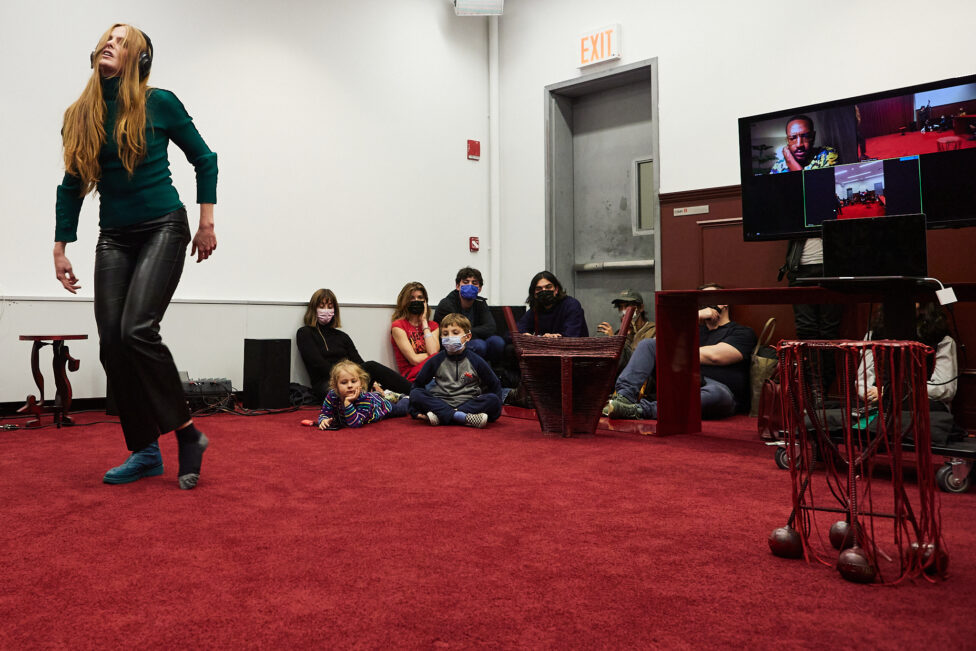
Photo by Christopher Garcia Valle. Still from “Untitled,” Performance Space NY Oct 2021, performed with Isabel Legate.
ID: A group of spectators sit on a red-carpeted floor watch Isabel perform with headphones on. Her hair draped in front of her face, her head tilted up, her knees bent. On the opposite side of the image is a TV screen showing a Zoom meeting with Elliot and different viewpoints of the red-carpeted room.
NH: I was introduced to your work during the COVID era. And from what I know of your work, it’s all engaging digitality in a really fun way—making videos, long-distance performances, and livestreams. Is that something that you’ve always been interested in? Or is that something that this moment has brought up in a particular way?
ER: No, I am a total DIY punk girl at heart. I mean, I dropped out of art school when I was a freshman and played music for many years. A lot of basements. A lot of warehouses in Chicago. My inspirations were experimental music, and also live art, experimental performance, and body art. But at the same time, I’ve always loved the super shiny polished sheen of a…
NH: Stage.
ER: Yeah, the stage. But also conceptual art. I’ve said this as a joke to my friends, but I’m kind of a modernist. My concerns are definitely contemporary, but the way that I engage with object-making and the stage, a lot of it starts from these conceptual performance ideas. People like Lucinda Childs, Benjamin Patterson, Yoko Ono, Sol LeWitt , Vito Acconci, Simone Forti, Bruce Nauman, George Lewis. People who utilize deceptively simple systems that produce something totally bizarre..
But to get back to your question, no, I wasn’t always working digitally. It was really more about being in the pit, sweating, whether it’s live performance or music. I would do some crazy shit. I climbed a billboard naked once in L.A… I flooded a gallery with ammonia… Lots of broken glass, jumping off of shit, crawling onto shit, hanging off of ladders, pulling scripts out of my ass, like the whole nine.
NH: I feel that, similarly and dissimilarly. We were talking before we started recording about my theater background, and how I have a deep love of pageantry. I always was obsessed with bringing together big scenic pieces. I go to Broadway shows by myself even today just to see moving set pieces. There’s something really thrilling to me about a large, automated set piece falling from the sky and landing in place.
I’m always trying to make really large performance gestures like that. But obviously, I’m working with limited resources and what is actually made has this cardboard, shoestring, DIY aesthetic that I have come to embrace. In my head, I see myself as a big opera director. But the realities of the work I am making exists in a slightly different lineage that brings me towards some of the modernists you mentioned.
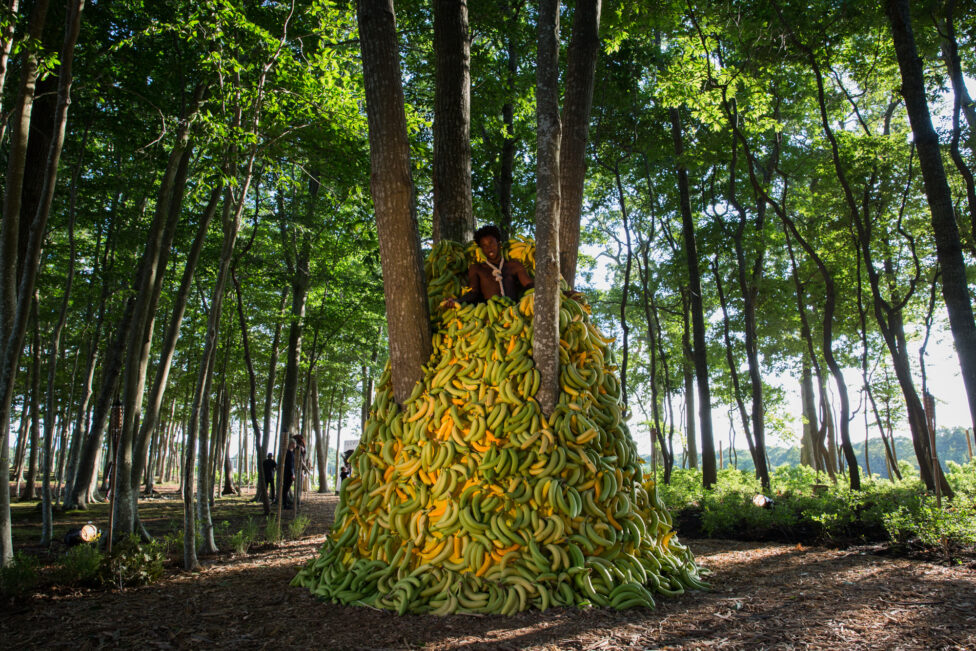
Photo by Chloe Bellemere
ID: A tall tower of green and yellow bananas sits in the middle of a forest. Nile is positioned on top of this banana tower, exposing his bare upper body and a noose around his neck.
To speak to the digital question, I never really embraced a lot of technology in my work until most recently. I felt like I was very much an analog girl, trying to craft things in the room with people. Then I started to become terminally online during the pandemic.
ER: Terminally online, wow.
NH: Online, and really felt like I was doing something else. Like “Bitch, I am researching the fucking choreographies of the moment. This is where it’s at. It’s all online.”
One of my collaborators at the time, Trevor Bazile, really emboldened in me this sense that participating in online culture was a type of performance. And that was enough. But now, I’m starting to feel less excited about online space as I’ve gotten a little tired of being so terminally online and feeling trapped in my own little digital cage. What I do like about being online is that I can kind of craft what people see, in a way. I’m a performer at heart. What people really hate about social media is what I really love about it. That is the performance of my life— just crafting what people see.
That brings me to my question about digital legacies, which I don’t really know what it means. In the wake of my friend passing away, what’s left is an active Instagram account that people can still comment on and engage with. I’ve been really concerned with the questions of what I will be, what I will leave behind after I pass away. Will it just be a server? Will it just be an Instagram account? And will that be satisfying? Similarly, I have the same question with performances. What will be left behind? How will I be remembered? And really understanding that I have no real control over that. But it’s something that I still try to curate: how will I be remembered? And that is kind of a cage for me. Is that something that you think about, how you’ll be remembered? You seem very in the moment, so I feel like you’re not super concerned with how you’ll be remembered.
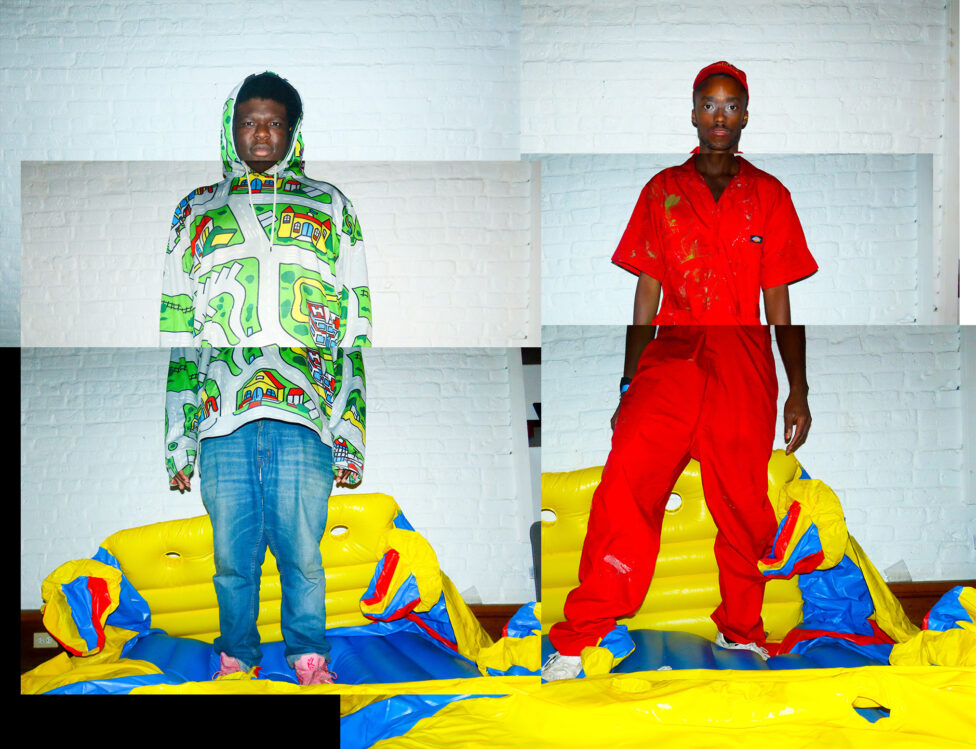
Photo by Victor Jeffreys II.
ID: Dressed in colorful clothing, Nile and Trevor, two dark-skinned Black people, stand solemnly on top of a deflated bounce house. The image is divided into distinct large blocks, creating a slight disjuncture in its composition.
ER: I’ve moved a lot in my lifetime; so far, six times in my 20s to different states. I used to have a ton of records, but I didn’t see it as such at the time. I also collected posters and flyers, because I started producing art and going to shows before Instagram, which, in such a short time, has completely changed the landscape of how people engage with events and communities. But I would actually make flyers for my performances, go to Kinko’s, make copies of posters, go to other events, look people in the eye and talk to them and give them a flyer and invite them, from the bottom of my heart. I was like, I’m here, you’re here, if you like this, you’ll probably like this other thing. Come check it out.
Eventually, I threw everything away because it was too much to hold while moving cross country. As the years go by, friends pass away, or people move or stop making music or go on to other projects. Keeping records didn’t seem serious at the time. I thought our contributions didn’t matter living in Chicago, but now I realize I had an amazing archive. There’s a real importance to anything that’s self-made… Some of my first CDs I made, I would handpaint the covers and literally produce an edition of 10.
NH: Already making limited editions, love that.
ER: I made what I could afford to make, and I made what I would sell so I could make more. It’s less of an idea of scarcity, but more about trying to create, even in the smallest way possible, some sort of footprint offline.
If you find enough value in the work you’re doing online to continue putting effort into making it, I wouldn’t feel any guilt nor hopelessness over trying to keep it. Instagram is not our platform, it’s a company. Maybe there’s a way, even if it’s as simple as logging screenshots and keeping them on a hard drive off of your computer. You can revisit those images and, years later, it could mean something different.
NH: I agree. I am really invested in trying to find a way to archive this stuff that isn’t on this tech company’s platform. I also was hearing something so beautiful about the posters that you’re making, but, at the time, you didn’t think that they had the inherent value that they needed to be stored.
That’s something that makes me kind of sad. It makes me kind of curious about … Is there a privilege that comes with archiving? Or…
ER: No. I’m not even gonna… And please put this on the record. Anyone who says to you there’s a privilege that comes with archiving, don’t even waste your breath and tell them to shut up. Put your paper away and keep it pushing.
Archiving doesn’t have to mean that you have a private moisture-free room at The Getty Research Institute. If you’ve ever seen pictures of your relatives: that’s an archive. Someone kept it with purpose. A recipe, a book, anything.
NH: My question was more about the feeling, inherently knowing that something is valuable.
ER: Oh, okay. I mean…
NH: I wasn’t just born knowing that the scribbles that I was doing in high school had value. But that speaks to how I was raised, or what the narratives around myself were.
Privilege is a weird word that I’m not attached to at all and hate the sort of discourse around it. It’s more the feeling of, this is something important to me. And I deserve to hold onto this because I might want to. There’s something there that I’m trying to tease out. Privilege is definitely not the word. Maybe it’s self-love and self-respect.
I went through a minimalism phase in my life, and then I threw out everything. I didn’t think it was valuable, worth holding on to. Or it was not going to be important to me or anyone in the future.
ER: How can you know, right? Also, people have found a way to commodify images as a finished product. So if you have something that doesn’t look like the commodified model y, it’s easy to feel like that something doesn’t matter.
I appreciate you going into detail more about what you meant. I’m sorry for jumping to a misunderstanding so quick.
NH: I love it. You heard a buzzword you did not like, you said stop. I appreciate that.
NH: Let’s talk about the D word dance. I have really been coming into my dancemaker era. I have a really big love for it now in a way that I didn’t know before. I always thought I was making plays and trying to force people to contextualize my work as theater. And then, once I realized that it didn’t really matter, I became really freed by the word dance. I saw how all-encompassing it could be and how there’s space for me in that form. I felt really excited by it. Is that something that you’ve experienced? Or how do you rectify your relationship to the word dance not being a former bunhead who comes from ballet or classical dance traditions?
ER: I also think of dance as a really freeing word. I encountered dance late, not as a monolith but as a living breathing practice and discipline. I realized that a lot of my questions about people and performers in space have already been asked within a dance context. A huge lightbulb went off. If I think about what it means to work with performers, or how to codify gestures, or live composition, that’s literally what dance is. It’s the art of navigating people in space.
NH: And in time.
I’ve been feeling a lot freer in my dance-making practices—freeing myself from the need to be original, perhaps? There’s no such thing as originality. It’s really hard to be original in the big age of 2022. I am not sure if being original is even valuable. I want to give myself space to follow my impulses, even if they are historically backed in certain ways. Or to recreate things that I was exposed to in the past, but had forgotten about. It’s been really exciting to me about seeing how those memories can come through my dances, and how there’s no such thing as a new dance.
ER: Yeah, heard. The biggest gift we have as performers is that no matter where we go, we carry the combined memory of all of our experiences, past and present, and the potential of anything we want to do, can do, or will do in the future. Something as simple as trying to recreate a dance to perfection—it’s physically impossible. There will always be some kink; you’re shorter or taller than someone, or their hips are tighter than yours, or you might have remembered something differently. Your physicality in the room is always gonna carry some of that special sheen of the individual.
In support of what you’re saying, you don’t have to worry about being original. No matter what happens, the second you make something, it will only ever be yours.
NH: The body as the archive. There’s certain dancers who have danced for a lot of choreographers. Then when they make original work, I see in their body—all of the histories of all the different dance makers that they’ve worked with. I find that to be the most beautiful thing, seeing all of those different histories in their bodies.
NH: Can we do my silly exercise, Elliot, of free associating words that start with L?
ER: Hell yeah, I’d love to.
NH: Okay, amazing. I want to talk about love. So we’ll start with Love as my first contribution to the list of L words
ER: Love.
NH: Longitude.
ER: Latitude.
NH: Laboratory.
ER: Luxurious.
NH: Lascivious.
ER: Luscious.
NH: La la la la la la la la. Legs.
ER: Languor.
NH: Lies.
ER: Lips.
NH: Liver.
ER: Libertine.
NH: Libertine is making me think of… liquor.
ER: Lesbian.
NH: Is Luddite a word? A luddite?
ER: Yeah, luddite. For sure.
NH: Luddites.
ER: This is a — live.
NH: Okay, a few more because I’m having fun now. Life.
ER: Likes.
NH: Luster.
ER: Hmm, okay. I was gonna say a word, but it was too similar to a different one. Lantern? Lantern.
NH: This is like that Wordle game that’s going viral right now. I am trying to guess short words. I’m out of L words. How is that possible? Um, laboratories, luster, lantern… Lingering.
ER: Okay, my last one is Listerine.
NH: Boom. Close it. Chapter closed.
ER: That done.
NH: Done. That’s the whole thing. Just us listing where to start with L.
ER: Killed it.
NH: Killed it. Destroyed it. Hit it.
ER: DOA. Dead on arrival. It’s over.
NH: The last question I have is about self-esteem and how you have cultivated it. Or if you don’t cultivate it or don’t have it? We work in a weird field. For me, personally, self-esteem has been hard to cultivate because of the nature of being so vulnerable in my work. Trying to cultivate vulnerability but always being open to people receiving you and having an opinion about it.
ER: A few things that I have learned. Number one is don’t let people see the work until it’s finished. I’ve noticed that a lot of people who think they’re my friends have a ton of opinions about the work I’m doing before it’s done. I’m learning to realize that even though I might work in a casual way, it’s still precious and important. I don’t have to share things in process or even talk about them if I don’t want to. Because there’s always people who ask, you’re making a performance about what? That’s weird. Or, I’ve seen this piece 1000 times! You get stuck in this loop of trying to pre-conceptualize or defend something before it’s done. It’s not good.
NH: I have a question about the work-in-process industrial complex. I feel like dancemakers are encouraged or forced to show their work in process as a part of the sort of non-profit residency cycle.
ER: That bothers me less because there’s a format. This is a work-in-process, but at least I had a month or whatever to make something. I’m talking about the sneaky shit that you don’t realize. It’s sometimes not even people in the industry. You think you’re having a friendly conversation in a bar and then next thing you know, you’re having an argument about a piece that doesn’t even exist yet, and second guessing it somehow. You need to have the fortitude. Even if it’s the smallest idea, don’t be afraid to hold it close until you’re ready to describe it.
Another thing I would say about self esteem: I was very lucky in the way that I came up as an artist, even though it felt really tragic at the time. I was super set on becoming a contemporary artist. And I got into a really good art school, The School of the Art Institute of Chicago. I really hated it. It was getting too expensive. I ended up dropping out. That was a huge blow to my self-esteem, because all I wanted to do was to enter the gallery system at 20 and just start selling work.
It’s weird. All the people that were doing the “right thing” in school aren’t even making art anymore. Because the problem with those kinds of environments is that yes, you can be exposed to a lot of different ideas and a lot of different concepts. But when you don’t have the life experience to go along with it, it becomes a game on how to produce work that’ll get you the best response during critique. Not how to actually push the needle forward, or even just have—I’ll use this word—an original thought as an individual.
It was a really hard 10 years. But after making some work and starting to encounter mentors and friends outside of the institution, I was like, oh shit, this person I’m really into fucks with me and the art that I’m doing. It was completely organic.
One last thing I’ll say about self-esteem. Once you make a piece, people can’t say shit. Yes, opinions matter, reviews matter. But what are you gonna do? I saw you. You can’t say you didn’t just sit here for an hour and a half. So I appreciate your opinion, but see you next year. This is what I have to offer. I’ll probably be on some other shit in another year or two.
NH: I love that. I have nothing that beautiful to say about self-esteem. It is something that I’m working to cultivate. I’ll keep everyone posted about how I’m doing on that journey soon.
ER: I’m rooting for you.
Cover Image Description: Dressed in a colorful and muscular body suit, Elliot appears on the big TV screen positioned below an “On Air” sign. There are smaller screens within the TV screen, showing a white room filled with stuff such as costumes, mic, tripod, etc.

